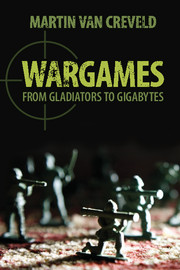Book contents
- Frontmatter
- Contents
- Acknowledgments
- Introduction
- 1 On animals and men
- 2 Games and gladiators
- 3 Trials by combat, tournaments, and duels
- 4 Battles, campaigns, wars, and politics
- 5 From bloody games to bloodless wars
- 6 Enter the computer
- 7 The females of the species
- 8 Conclusions: The mirrors and the mirrored
- Index
- References
Introduction
Published online by Cambridge University Press: 05 April 2013
- Frontmatter
- Contents
- Acknowledgments
- Introduction
- 1 On animals and men
- 2 Games and gladiators
- 3 Trials by combat, tournaments, and duels
- 4 Battles, campaigns, wars, and politics
- 5 From bloody games to bloodless wars
- 6 Enter the computer
- 7 The females of the species
- 8 Conclusions: The mirrors and the mirrored
- Index
- References
Summary
Where did wargames come from? What purposes did they serve? Who participated in them, why, and what for? What forms did they take? What factors drove their development, and to what extent did they reflect changes in the art of war itself? What did they simulate, what didn’t they simulate, how, and why? What do they reveal about the conduct of war at the times, and in the places, where they were played? How useful are they in training for war and preparing for it? Why are some so much more popular than others, how do men and women compare in this respect, and what can the way the sexes relate to wargames teach us about the relationship between them? Finally, what does all this tell us about real war, fake or make-believe war, and the human condition in general? These are the sorts of questions the present volume will try to answer. Before it can do so, however, it is first of all necessary to say a word about what wargames are, where they stand in relation to other kinds of games on the one hand and to “real” war on the other, what has been written on them, what may be learnt from them, and where all this may lead.
What is a wargame?
Games, including wargames which form the subject of this book, are all around us. Even the most superficial observation will soon conclude that not only humans but many kinds of animals engage in games, i.e. play. The great Dutch historian Johan Huizinga has argued, to my mind with very good reason, that not economic needs (as Karl Marx thought) but play and games represent the real source from which all human culture, everything beautiful, true and good, springs. In his view, a game is an activity characterized above all by the fact that it creates its own little world. To this end it is carefully and often ceremoniously separated from “real life,” standing to the latter as the terrarium or tableau in a glass paperweight does to the room in which it is positioned. Within the space where the game is held, and for as long as it lasts, cause and effect are abolished. The nature of the activity does not matter much. Provided it is done for its own sake, for “fun,” as people say, almost anything may be turned into a game.
Information
- Type
- Chapter
- Information
- WargamesFrom Gladiators to Gigabytes, pp. 1 - 8Publisher: Cambridge University PressPrint publication year: 2013
